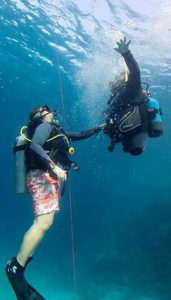2021 is going to be a great year, diving, right here in the UK. Divecrew are already working on overseas trips, subject to Covid and air corridors. Get Hammered is always a popular trip to the Red Sea and 2021 will see the brand new luxury boat being used by Divecrew. But, we also dive the UK. Shore and boat dives. Sea and inland lakes.
As well as these overseas trips like Get Hammered, Divecrew are investing lots of time and effort into diving in the UK. There are some incredible places to dive and not all inland lakes either. Here is just a few sea dives: Swanage Pier – shallow water diving circa 6 metres great for new divers. Chesil Beach – an easy shore dive with circa 12 metres maximum depth, again great for new divers wanting to cut their teeth. Lundy and Farnes – ever popular with our Divecrew Divers. Boat dives with normally the first very shallow circa 6-8 metres. Why so shallow? Well when the divers get in the water all the seals know it is playtime. A truly incredible experience and the reason it sells out quickly. Porthkerris – boat dives circa 25 metres maximum depth. Includes wrecks, pinacles and an amazing ‘river’ dives (shallow circa 6 metres) collecting scallops.
Divecrew also have inland lake opportunities for divers pleasure diving and or lessons. Wraysbury near Heathrow is fairly shallow with platforms around 4 to 7 metres and lots of attractions. Vobster is deeper circa 35 metres, again with lots of underwater attractions. Or the NDAC Chepstow (National Diving and Activity Centre) with a maximum depth of 75 metres and tons of attractions to keep divers amused. In some locations one can expect good visibility to be circa 6 to 8 metres.
So cold water diving or should we say COOL diving. You can dive all year in the UK. However, 5mm wet suits may be okay for short dives in the summer, but, to be really comfortable and safe you need to be a dry suit diver. Hypothermia is not good for divers.
Divecrew have a range school rental suits or you splash out with a made to measure suit. Want to stay on a tighter budget? Check out the dive centres SALE RAIL. Just check with the dive centre and or the on line shop. Some incredible dry suits and incredible prices. Quality Scubapro, Aqualung or Typhoon suits reduced in price.
Diving in the UK makes diving overseas a real walk in the park. Buoyancy is pivotal to good diving and being a motor skill, the only way to be good is constant practice. Being in the water regularly makes everyting second nature.
The UK trips do invlove a cost as the boat has to be paid and there is your accommodation. Some UK trips like Swanage and Chesil have a very small fee as they are shore dives. Inland lakes have local fees for diver entry.
Divecrew will post on the web site and Facebook the list of overseas and UK diving opportunities. Divecrew state the diving conditions and recommendation on diving certification levels. Divecrew pleasure dives are always led by a Divecrew Professional. The professional is not there to teach, but, at divecrew we do look after our own divers.
Check out the various options and become a Divecrew Diver.
The Video below is Vobster Quay.

 At Divecrew we try not to teach divers as a homogenous group. Everyone is different. So how did we get to the this point? Well first thing is we challenge some agencies as they tend to turn our “sheep” instructors. Instructors being professional should use a range of skills and techniques so that every diver student can be taught in comfort and safety. Working with Deptherapy and injured troops heightened our senses to the individual needs of the divers. The “sheep” mentality is challenged as to what is a technique and what is a standard. For example many instructors talk of a giant stride as a deep water entry. So what is the best entry for a student? The easiest! Simple. The standards state a deep water entry not a giant stride.
At Divecrew we try not to teach divers as a homogenous group. Everyone is different. So how did we get to the this point? Well first thing is we challenge some agencies as they tend to turn our “sheep” instructors. Instructors being professional should use a range of skills and techniques so that every diver student can be taught in comfort and safety. Working with Deptherapy and injured troops heightened our senses to the individual needs of the divers. The “sheep” mentality is challenged as to what is a technique and what is a standard. For example many instructors talk of a giant stride as a deep water entry. So what is the best entry for a student? The easiest! Simple. The standards state a deep water entry not a giant stride.